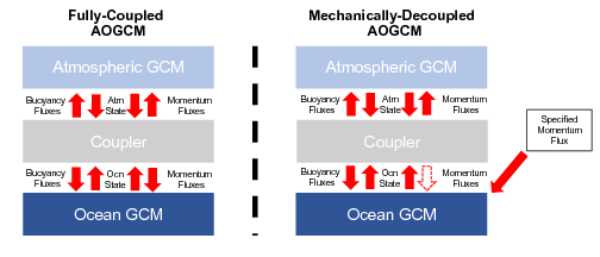Data and Code from: Retaining Short-Term Variability Reduces Mean State Biases in Wind Stress Overriding Simulations
Data and Code from: Retaining Short-Term Variability Reduces Mean State Biases in Wind Stress Overriding Simulations
About this collection
- Extent
-
2 digital objects.
- Cite This Work
-
Luongo, Matthew T.; Brizuela, Noel G.; Eisenman, Ian; Xie, Shang-Ping (2024). Data and Code from: Retaining Short-Term Variability Reduces Mean State Biases in Wind Stress Overriding Simulations. UC San Diego Library Digital Collections. https://doi.org/10.6075/J0TQ61RP
- Description
-
Fortran source code developed to override wind stress with a climatology in the Community Earth System Model (CESM) v. 1.2 and resulting GCM output data from Luongo et al. (2024).
Abstract of source study:
Positive feedbacks in climate processes can make it difficult to identify the primary drivers of climate phenomena. Some recent global climate model (GCM) studies address this issue by controlling the wind stress felt by the surface ocean such that the atmosphere and ocean become mechanically decoupled. Most mechanical decoupling studies have chosen to override wind stress with an annual climatology. In this study we introduce an alternative method of interannually varying overriding which maintains higher frequency momentum forcing of the surface ocean. Using a GCM (NCAR CESM1), we then assess the size of the biases associated with these two methods of overriding by comparing with a freely evolving control integration. We find that overriding with a climatology creates sea surface temperature (SST) biases throughout the global oceans on the order of ±1°C. This is substantially larger than the biases introduced by interannually varying overriding, especially in the tropical Pacific. We attribute the climatological overriding SST biases to a lack of synoptic and subseasonal variability, which causes the mixed layer to be too shallow throughout the global surface ocean. This shoaling of the mixed layer reduces the effective heat capacity of the surface ocean such that SST biases excite atmospheric feedbacks. These results have implications for the reinterpretation of past climatological wind stress overriding studies: past climate signals attributed to momentum coupling may in fact be spurious responses to SST biases. - Creation Date
- 2022 to 2023
- Date Issued
- 2024
- Authors
- Funding
-
NASA FINESST Fellowship 80NSSC22K1528
NSF grant OCE-2048590 - Geographic
- Topics
Formats
View formats within this collection
- Language
- English
- Identifier
-
Identifier: Ian Eisenman: https://orcid.org/0000-0003-0190-2869
Identifier: Matthew T. Luongo: https://orcid.org/0000-0002-2996-7579
Identifier: Noel G. Brizuela: https://orcid.org/0000-0002-7294-6810
Identifier: Shang-Ping Xie: https://orcid.org/0000-0002-3676-1325
- Related Resources
- Luongo, M.T., Brizuela, N.G., Eisenman, I., & Xie, S.-P. (2024). Retaining Short-Term Variability Reduces Mean State Biases in Wind Stress Overriding Simulations. Journal of Advances in Modeling Earth Systems, 16, e2023MS003665. http://doi.org/10.1029/2023MS003665
- Github repository for ocean variable daily output source code: https://github.com/mattluongo/DailyOutput_TauxTauy_SurfUV_CESM1
- Github repository for wind stress overriding source code: https://github.com/mattluongo/TauLock_CESM1
Primary associated publication
Software
 Library Digital Collections
Library Digital Collections
